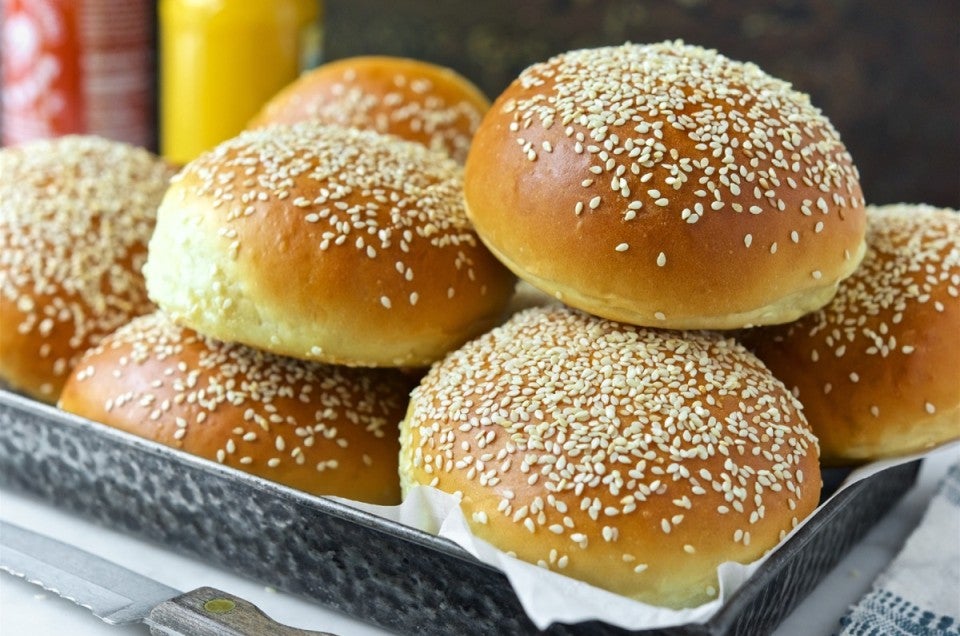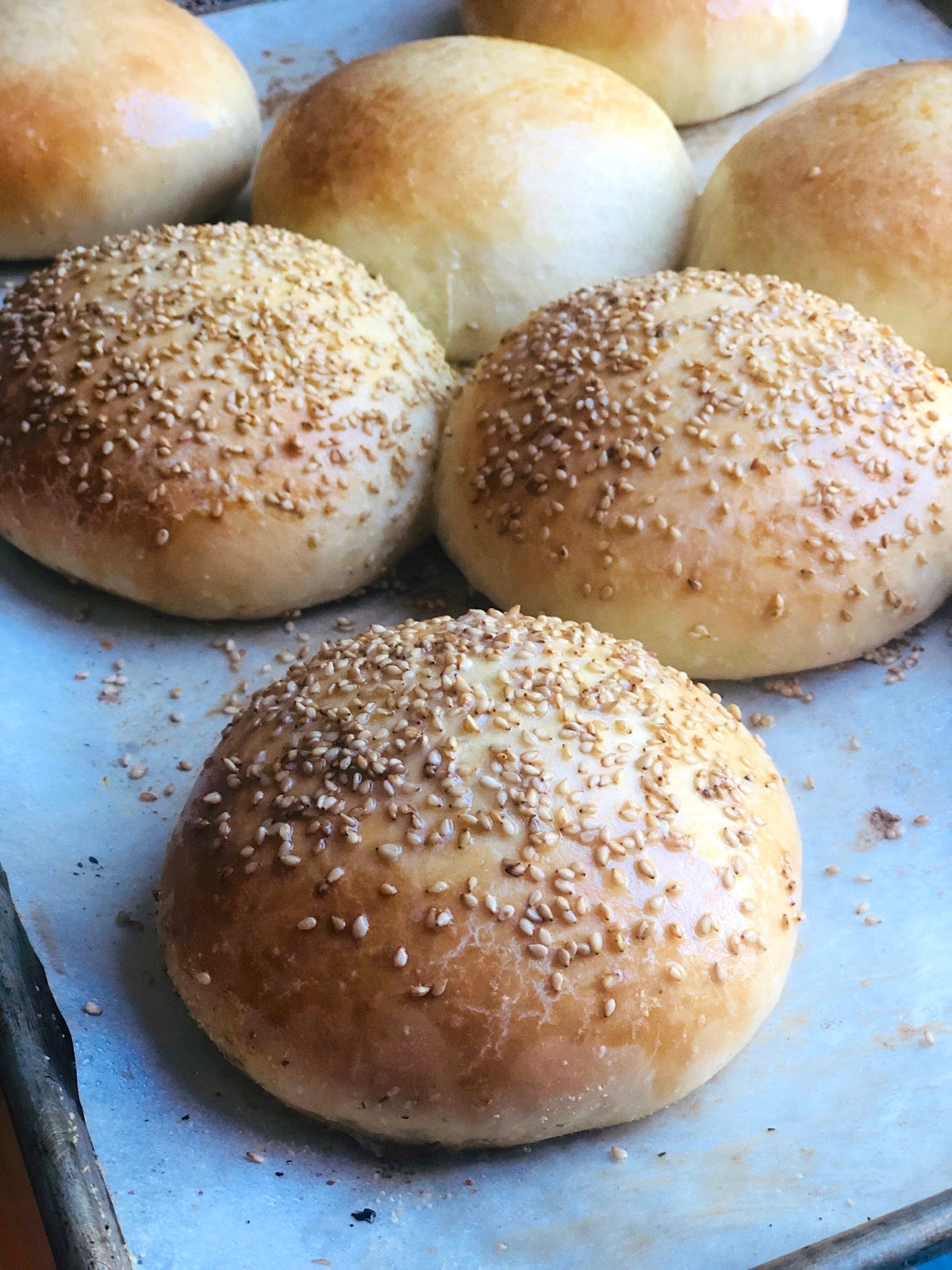


A lazy weekend afternoon. Friends and family are back together again, the long, lonely months of pandemic solitude gradually fading. Sun slants through the trees; smoke from a barbecue drifts lazily skyward. Soon you’ll hear the hot sizzle of burgers (beef or Beyond); people grab plates, scooping out pasta salad and pickles and potato chips as they gather at the grill in anticipation …
It’s time to break out the Beautiful Burger Buns!
So what makes these buns “beautiful” in the eyes of milions of beholders, who’ve made Beautiful Burger Buns the second most loved recipe on our website?

Partly it’s their golden good looks, their mild yet buttery flavor, and their large capacity for any kind of filling, from the expected burger to curried chicken salad or garlicky hummus and cucumbers.
But in my eyes, what’s most beautiful about these buns is their backstory.
Back in 2001, years before Facebook, Instagram, and the other social media platforms so widely used today, King Arthur created an online baking community called The Baking Circle. Bakers from multiple generations, stations in life, and cultures throughout the world connected in ways that only those who love to bake can understand.
People asked (and answered) questions; they made cookbook recommendations, shared favorite baking techniques, and vented when their bread didn’t turn out exactly as planned.
But mostly, people shared recipes. Beautiful Burger Buns, a.k.a. “Moomie’s Buns,” was originally posted by Ellen (screen name: Moomie), a Midwest farmer. These oversized (and surprisingly sturdy) buns, with their soft interior and tender, buttery crust, evoked a ton of responses. Eventually they became the Circle’s most popular recipe; and Ellen one of the community’s favorite members, a celebrity in her own quiet way.
The Baking Circle was shut down 5 years ago, a victim of ever-evolving technology. But Moomie’s recipe lives on: not just online, but in our newly reissued and revised Baker’s Companion cookbook, where it will continue to shine forever.

The All-Purpose Baker’s Companion is a collection of thoroughly tested recipes that not only work well and taste good, but are (or once were) someone’s specialty, a family favorite. Every recipe in the book comes with its own sweet story, and even though we couldn’t print all the stories, the employee-owners at King Arthur Baking know them. In many cases, we lived them.
Take Scandinavian Gold Cake. This recipe comes from Sue, longtime leader of our research and development team. Sue's grandmother brought the recipe from Sweden a century ago and made it regularly for a hungry family growing up in America’s Great Depression. Sue continues to make her grandma’s cake to this day — and will no doubt introduce it to her first grandchild, born this past summer.
Our Baker's Companion offers a heaping helping of just about everything baked, from family favorites to our 2020 Recipe of the Year, Crispy Cheesy Pan Pizza — a brand-new classic. Along with tips, techniques, and teaching moments, over 450 recipes in The Baker’s Companion (many not available online) await your discovery. Let me tempt you with Beautiful Burger Buns, an old favorite that’s become one of the book’s newest additions.
Simple ingredients and basic techniques yield mouthwatering buns: what’s not to like?
*For best results (a smooth, soft, slightly sticky dough), use the smaller amount of water in summer (or in a humid environment); the greater amount in winter (or in a dry climate); and something in between the rest of the time. Want details? See this post: Winter to summer yeast baking.
*For added richness and color, add the yolk left over from separating the egg to the dough above.
Mix and knead all of the dough ingredients — by hand, mixer, or bread machine — to make a soft, smooth, somewhat sticky dough.

Cover the dough and let it rise until it's nearly doubled in bulk, about 1 to 2 hours.

To shape the buns: Gently deflate the dough and divide it into eight pieces (about 100g each).

Shape each piece into a ball. Place the balls on a lightly greased or parchment-lined baking sheet, and flatten each one with the palm of your hand until it's about 3" across. Don't skip this step! You want buns that are wide rather than tall, ideal for burgers or other sandwich fillings.

Cover the buns and let them rise until noticeably puffy, about an hour. Toward the end of the rising time, preheat the oven to 375°F.
Brush the buns with about half (21g) of the melted butter.

To make seeded buns, brush the egg white/water mixture right over the melted butter; it'll make the seeds adhere. Sprinkle buns with the seeds of your choice.

Bake the buns for 15 to 18 minutes, until golden. Remove them from the oven and brush with the remaining melted butter; this will give the buns a satiny, buttery crust. If you've made seeded buns apply the melted butter carefully, to avoid brushing the seeds off the buns.
Cool the buns on a rack and, when cool, store airtight for a few days at room temperature. Or freeze the buns for longer storage; I like to wrap each bun individually, then stow them all in a large bag.
Upon reading this post one of my blogging colleagues, Posie, offered the following good news for those of you eating vegan: “My mom and I both regularly make these either without eggs or fully vegan. We substitute 3 tablespoons of aquafaba [the liquid drained from a can of chickpeas] for the egg, and 2 tablespoons of olive oil for the butter. Another King Arthur colleague makes them vegan by subbing 3 tablespoons of sweet potato purée for the egg, and oil for the butter.”

Looking to supplement your burgers with sides and dessert? Check out these one-stop recipe collections: Summer Cookout Recipes and Classic Summer Desserts.
Cover photo by Liz Neily

